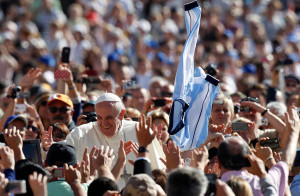By Tajha Chappellet-Lanier
Staff Writer
Pope Francis I has been making headlines  since the night he was chosen as Pope. Fellow newsreaders may remember his early days in Rome, when he attracted attention by paying for his own hotel room and, famously, taking the bus to the Vatican. The societal values implicit in this are truly bizarre, but the psychology of why we allow our leaders to live beyond the reach of common courtesy will have to be the subject of another article. First, attention must be directed to what exactly the new Pope has done to earn himself the spotlight of a media darling, and what change, if any, his rhetoric signals.
since the night he was chosen as Pope. Fellow newsreaders may remember his early days in Rome, when he attracted attention by paying for his own hotel room and, famously, taking the bus to the Vatican. The societal values implicit in this are truly bizarre, but the psychology of why we allow our leaders to live beyond the reach of common courtesy will have to be the subject of another article. First, attention must be directed to what exactly the new Pope has done to earn himself the spotlight of a media darling, and what change, if any, his rhetoric signals.
In August of this year, Pope Francis was interviewed by the Italian Jesuit journal La Civiltà Cattolica, and the interview was recently published both in Italian and in English by America, a national Catholic review. Many of his comments in this interview gained media scrutiny, as he urged the Church to rest its dogmatic focus on homosexuality, abortion, and contraception. By focusing too much on “small-minded rules”, the Pope maintained, the Church loses sight of its overall goals of love and acceptance, of creating a home for all. In an excellent use of analogy, Francis warned that the “moral edifice of the church is likely to fall like a house of cards” if it continues to alienate potential faithful through its stringent opposition to homosexuality and women in power.
The Pope’s statements have been welcomed by liberals, both Catholic and otherwise, and have garnered ‘disappointment’ among conservative Catholics. Understandable as this may be, it raises questions about the importance and relative power of Francis’ rhetoric. Is the new Pope a reformer, even a revolutionary? Or will his liberal leanings be overpowered by a conservative Vatican bureaucracy?
There exists a fair amount of doubt as to whether the Pope can make a significant change to the church. As Marina Hyde wrote in The Guardian, “the idea that comments [by Pope Francis]… represent some sort of material change in the complex doctrinal politics of his organisation (sic) seems doctrinally naïve.”
Indeed, Francis is just the figurehead of the Catholic Church, a large organization that undoubtedly includes those that would disagree with his reasoning. While he may pursue a Church that preaches love over dogma and inclusion over doctrine, the acceptance of this ideology by the clergy no doubt largely determines its eventual importance.
Still, others argue, a change in discourse is not marginal or unimportant. Pope Francis is the face of the Catholic Church to the outside world, and as such, he exercises significant influence in shaping public perception of the Church. This rather constructivist view of Papal politics holds that no matter what the ‘truth’ of Vatican bureaucracy may be, the Church effectively becomes a version of Pope Francis’ ideal the moment his followers choose to accept his discourse.
No matter which side of the issue one falls, it is worth understanding that the new Pope came to power at a critical moment for the Church; a moment in which he faces the crucial task of rehabilitating the image of the Church in light of a certain mass of sexual abuse and corruption scandals. Pope Francis appears to have chosen the line from which he will combat such negative associations. And in that his words have found resonance, perhaps he can be seen to be knocking at a door that the Catholic Church will need to open in order to remain relevant in today’s world.
Tajha Chappellet-Lanier, class of 2014, is a Politics and Law major from Big Sur, California, United States.
